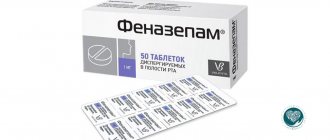Analgin is a widely used medication that has an affordable price. It belongs to the group of non-steroidal anti-inflammatory drugs. Its peculiarity is its pronounced analgesic and antipyretic properties.
The drug is produced in ampoules for intramuscular administration and in tablets. The second form is more popular. One tablet of the drug contains 250 or 500 mg of metamizole sodium. The active substance provides a strong analgesic, antipyretic and anti-inflammatory effect. It is quickly absorbed into the gastrointestinal tract and subsequently excreted by the kidneys.
What does analgin help with?
The question of what analgin helps with is very common. The range of applications of this medicinal pain reliever is extremely wide. It can be used to relieve pain of various etiologies, in particular:
- After injury or surgery.
- Caused by spasms of the muscles of internal organs.
- Caused by the development of tumor processes.
As the instructions for Analgin indicate, it is indicated to alleviate the condition of patients with chronic pain of varying intensity. It allows you to stabilize the body’s condition when it is impossible to carry out other effective therapeutic measures. Analgin is used, the instructions for use indicate this, in order to lower high temperatures in infectious diseases, if this has not been achieved with other antipyretic drugs.
It is quite difficult to list exactly what analgin helps with due to the wide range of uses of the medicine. The most commonly taken tablets are for headaches and toothaches. It has proven its effectiveness in neuralgia and myalgia. In combination with antispasmodic drugs, analgin alleviates the patient's condition with renal and biliary colic.
Pharmacological properties and composition
The active component in the medication is metamizole sodium, which helps block the transmission of pain impulses in the thalamus, thereby revealing analgesic properties.
The drug is available in tablet form; in addition to the main substance, it contains additional components:
- calcium stearate;
- potato starch;
- granulated sugar;
- talc.
The pharmacological action of the drug is aimed at inhibiting the synthesis of prostaglandins, which are regulators in the development of the inflammatory process, which causes anti-inflammatory properties. However, the anti-inflammatory effect is less pronounced compared to other representatives of this class. Therefore, the antipyretic effect is more intense due to heat transfer from the body. Analgin has antispasmodic activity, providing relaxation of smooth muscles.
Main properties of the medicine:
- Relief of attacks of headaches, except chronic migraine.
- Toothache of various origins.
- Reducing the threshold of sensitivity during menstrual cramps.
- Pain caused by diseases of the musculoskeletal system (bruise, fracture, joint injuries).
- Relief of pain in the postoperative period.
Contraindications and adverse reactions
The main contraindication for taking the drug is hypersensitivity to the active component in its composition. Treatment with the drug in the 1st trimester of pregnancy is strictly prohibited. If possible, you should refrain from taking it during other periods of pregnancy and during breastfeeding until the child reaches 3 months of age. The drug is not prescribed to children under 10 years of age, and before reaching adulthood, when using the medicine, you should first consult a doctor.
Treatment with analgin should be discontinued if hematopoiesis is suppressed. In particular, agranulocytosis, which is characterized by changes in peripheral blood, is a contraindication. This is accompanied by severe symptoms: weakness, bleeding, problems with the digestive system, etc.
It is strictly forbidden to use analgin to relieve acute pain in the abdominal area until the causes of their occurrence are determined. It is also not recommended to use the drug for the following pathologies:
- Kidney or liver failure.
- Anemia.
- Leukopenia.
- Bronchial asthma.
- Pyelonephritis and glomerulonephritis
Failure to comply with contraindications and overdose may result in dangerous allergic reactions. This often manifests itself as a rash on the skin and Quincke's edema. In rare cases, anaphylactic shock, Lyell's syndrome or Stevens-Johnson syndrome develops.
You cannot take analgin for a long time for pain relief. Otherwise, you can provoke blood count violations. The risks of developing leukopenia or thrombocytopenia increase significantly.
Other possible adverse reactions of the body:
- An attack of bronchospasm.
- Reduced blood pressure.
- Malfunction of the kidneys.
If any negative side reactions occur, you should stop taking the drug. It is advisable to inform your doctor about this and consult about a possible replacement of the pain medication.
An overdose is recorded when using the medicine for a week in large doses to relieve pain. In this case, nausea and severe vomiting, decreased blood pressure and shortness of breath, delirium and impaired consciousness, as well as many other dangerous disorders of the body, may occur. You should urgently rinse and take saline laxatives. An increased drinking regimen and intake of absorbents are indicated. In severe cases, hemodialysis will be necessary.
Analgin
When treating patients receiving cytotoxic drugs, metamizole sodium should only be taken under medical supervision.
Anaphylactic/anaphylactoid reactions
When choosing a method of drug administration, it should be taken into account that parenteral use is associated with a higher risk of anaphylactic/anaphylactoid reactions.
The following conditions cause an increased risk of developing hypersensitivity reactions to metamizole sodium:
- bronchial asthma induced by taking analgesics;
- intolerance to analgesics such as urticaria or angioedema;
- complete or incomplete combination of bronchial asthma, recurrent polyposis of the nose and paranasal sinuses and intolerance to acetylsalicylic acid or other non-steroidal anti-inflammatory drugs (including a history);
- chronic urticaria;
- alcohol intolerance (increased sensitivity to alcohol), against the background of which, even when taking a small amount of certain alcoholic beverages, patients experience sneezing, lacrimation and severe redness of the face. Alcohol intolerance may indicate a previously unidentified syndrome of bronchial asthma associated with analgesics (aspirin asthma);
- intolerance or hypersensitivity to dyes (for example, tartrazine) or to preservatives (for example, benzoates);
- a history of anaphylactic or other immunological reactions to other pyrazolones, pyrazolidines and other non-narcotic analgesics (see section “Contraindications”).
Before using the drug Analgin, it is necessary to conduct a thorough interview with the patient. If it is determined that the patient is at particular risk of developing anaphylactoid reactions, the drug should be prescribed only after carefully weighing the possible risks and expected benefits. If a decision is made to use the drug Analgin in such patients, strict medical monitoring of their condition will be required, and it is necessary to have means to provide them with emergency care in the event of the development of anaphylactic/anaphylactoid reactions.
In predisposed patients, anaphylactic shock may occur, so patients with bronchial asthma or atopy should be prescribed metamizole sodium with caution.
Severe skin reactions
Life-threatening skin reactions, such as Stevens-Johnson syndrome (SJS) and toxic epidermal necrolysis (TEN), have been described with the use of metamizole sodium. If symptoms of SJS and TEN (such as progressive skin rash, often with blistering or mucosal lesions) appear, treatment with metamizole sodium should be discontinued immediately. It is prohibited to ever repeat treatment with the drug.
Patients should be informed about the subjective and objective symptoms of these diseases. They should be carefully monitored for skin reactions, especially during the first weeks of treatment.
Agranulocytosis
Agranulocytosis, which develops during treatment with metamizole sodium, is of immunoallergic origin and lasts for at least one week. This reaction occurs very rarely and can be severe, life-threatening and even fatal. This reaction is not dose-related and may occur at any time during treatment.
All patients should be instructed to discontinue use of the drug and immediately consult their physician if the following subjective and objective symptoms possibly associated with neutropenia occur: fever, chills, sore throat, mouth ulcers. In case of development of neutropenia (number of neutrophils <1500 per mm3), it is necessary to immediately stop treatment, urgently perform a detailed general blood test and continue to monitor the blood composition until the corpuscles return to normal values.
Pancytopenia
If pancytopenia develops, treatment should be stopped immediately; complete blood count parameters should be monitored until they return to normal.
All patients should be instructed that if, during treatment with metamizole sodium, subjective or objective symptoms suggestive of pathological changes in the blood (for example, general malaise, infections, persistent fever, bruising, bleeding, pallor) appear, they should immediately seek medical attention. help.
Isolated hypotensive reactions
Administration of metamizole sodium may cause isolated hypotensive reactions. These reactions may be dose dependent and occur more often after parenteral administration.
Acute abdominal pain
It is unacceptable to use the drug Analgin to relieve acute abdominal pain (until the cause is determined).
Liver and kidney dysfunction
In patients with impaired liver and kidney function, Analgin should be used only after consulting a doctor, since in these patients the rate of elimination of the drug is reduced.
Impact on laboratory results
In patients treated with metamizole, changes in the results of laboratory tests performed using the Trinder test and similar tests (for example, analysis of serum creatinine, triglycerides, HDL cholesterol and uric acid concentrations) were recorded.
Dosage
Only if it is impossible to take pills for any reason, intramuscular or intravenous injections are indicated. A single dose is 1-2 ml of a 50% solution of metamizole sodium. The daily dose should not exceed 4 ml.
To relieve pain, it is recommended to take a 500 mg tablet. For acute pain, the dose can be increased one-time to 2 tablets. You can take no more than 4 tablets per day, divided into 2-3 doses. The duration of therapy should not exceed 5 days. Analgin is taken as an antipyretic for no more than 3 days.
If you follow the dosage recommendations, problems with concentration and reaction speed are completely eliminated. Therefore, when using analgin to relieve pain, there are no restrictions on driving a car. Dangers arise only when large doses are used.
When using the drug, it should be taken into account that the toxic effects can be enhanced by other non-narcotic analgesics. It is also undesirable to use analgin simultaneously with tricyclic antidepressants and contraceptives. Barbiturates and phenylbutazone reduce the effectiveness of the drug, and sedatives and tranquilizers enhance it. The consumption of alcoholic beverages during pain relief with analgin is strictly prohibited.









